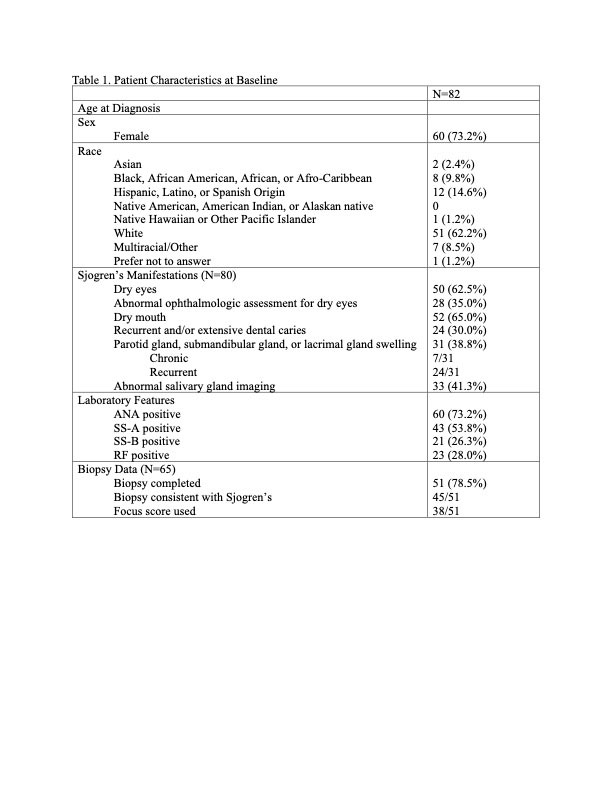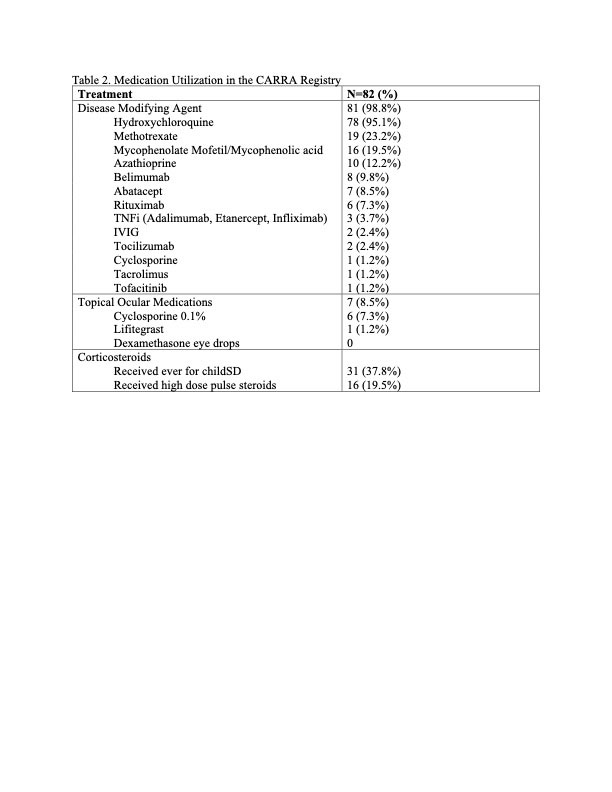Session Information
Session Type: Poster Session D
Session Time: 1:00PM-3:00PM
Background/Purpose: Childhood Sjogren’s Disease (childSD) is a rare complex chronic autoimmune disease primarily affecting lacrimal and salivary glands. Currently there is a paucity of information about this unique population. In particular, medications are being used to treat childSD in clinical practice, yet there is little published data on medication use for this disease. The purpose of this study is to utilize the Childhood Arthritis and Rheumatology Research Alliance (CARRA) Registry to retrospectively examine the medications used to treat childSD in a cohort. We hypothesize that many different disease modifying agents (DMARDs) and biologic medications are being used to treat childSD.
Methods: Patients who were enrolled in the CARRA Registry with a diagnosis of primary childSD were eligible for inclusion. The CARRA registry is a North American database of information collected about pediatric rheumatic disease and includes childSD. Descriptive statistics were used for demographics and baseline characteristics. Medication usage was reported as a proportion of patients who have received each medication.
Results: Of the 82 patients with primary childSD in the registry, the cohort was majority female (73.2%) and white (62.2%) (Table 1). The average age of diagnosis was 13.4 years (10.8, 16.6). The most common clinical features were dry mouth (65.0%) and dry eyes (62.5%). Evaluation for childSD were notable for positive SS-A in 53.8%, abnormal salivary gland imaging in 41.5%, and a biopsy consistent with childSD in 62.2%. Almost all patients received disease-modifying therapies (DMARDs) (81/82) with the most common being hydroxychloroquine (95.1%), methotrexate (23.2%), and mycophenolate/mycophenolic acid (19.3%) (Table 2). Hydroxychloroquine monotherapy was seen in 41.5% of the cohort, and 26.8% were treated with a biologic. Topical ocular medications were not commonly used.
Conclusion: This robust cohort allowed us to describe previously unknown pharmacologic treatment patterns in childSD. While hydroxychloroquine is the most commonly prescribed medication, many other DMARDs including biologic medications are also often prescribed. This study identified medications being prescribed for childSD so that more in-depth studies on medication treatments can be completed in the future. Next steps include examining medication patterns and determining how provider and patient measures of disease activity change after starting medications.
To cite this abstract in AMA style:
Treemarcki E, Basiaga M, Lieberman S, Stern S. Medication Use in Childhood Sjogren Disease [abstract]. Arthritis Rheumatol. 2022; 74 (suppl 9). https://acrabstracts.org/abstract/medication-use-in-childhood-sjogren-disease/. Accessed .« Back to ACR Convergence 2022
ACR Meeting Abstracts - https://acrabstracts.org/abstract/medication-use-in-childhood-sjogren-disease/


